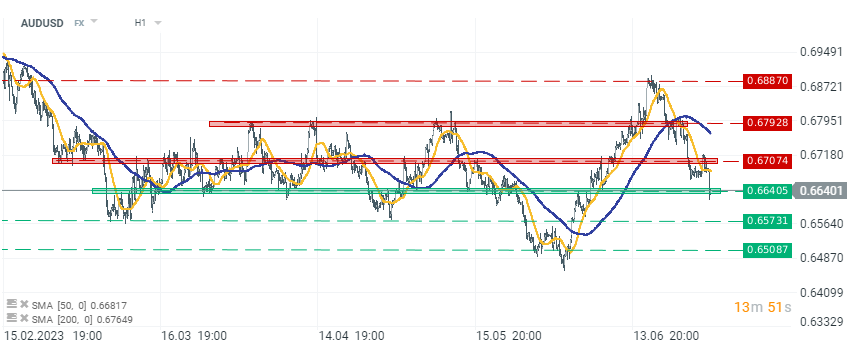-
Indexes from the Asia-Pacific region traded mixed during today’s session. Nikkei rose by 1.1%, S&P/ASX 200 gained 0.9% and Kospi fell by 0.5%. Chinese indexes underperformed and dropped by 0.3%.
-
Asian stocks were mixed, influenced by a positive Wall Street rally driven by US consumer confidence and home sales.
-
European futures contracts for indexes indicate a flat opening of the cash session on the Old Continent.
-
The Australian dollar declined by 1% due to weaker-than-expected inflation data, potentially pausing rate hikes, while the yen strengthened following verbal intervention in Tokyo.
-
Wall Street responded positively to the latest data highlighting economic resilience, despite the implication of continued tight Federal Reserve policy.
-
Tech megacaps, including Tesla, Snowflake, and Meta Platforms (Facebook's parent), led the rebound in equities, with Nasdaq 100 up almost 2%, while Alphabet underperformed due to concerns about Google's fast-paced AI expansion.
-
US stock futures fell after a late-breaking Wall Street Journal report that the Biden administration was considering new restrictions on artificial intelligence chip exports to China
-
Goldman Sachs CEO believes it is unlikely for inflation to reach 2% soon, and the US might experience a period of low growth (0-1%) and higher inflation (4%).
-
Australian CPI for the year came in at 5.8%, lower than the forecast of 6.1% and previous 6.8% figure, indicating weaker inflationary pressure.
-
Russian gasoline exports decreased by 30% in June compared to May, while gasoline production at Russian refineries increased by 3.1% year-on-year.
-
US President Biden expresses confidence in the strong economy, ruling out the possibility of a recession.
-
Hawkish European Central Bank officials are considering options to accelerate the reduction of the institution's €5 trillion ($5.5 trillion) bond holdings.
 The Australian dollar AUDUSD suffered a decline as May's monthly inflation data showed a figure of 5.6%, significantly lower than the consensus estimate of 6.1%. While core measures remained above 6%, it was the headline number that had an immediate impact on the market, leading to a depreciation of the AUD. As a result of this data, it is likely that the Reserve Bank of Australia will maintain its current cash rate at the upcoming meeting on July 4th.
The Australian dollar AUDUSD suffered a decline as May's monthly inflation data showed a figure of 5.6%, significantly lower than the consensus estimate of 6.1%. While core measures remained above 6%, it was the headline number that had an immediate impact on the market, leading to a depreciation of the AUD. As a result of this data, it is likely that the Reserve Bank of Australia will maintain its current cash rate at the upcoming meeting on July 4th.

📅 ปฏิทินเศรษฐกิจ: ตัวเลข NFP และ รายงานปริมาณน้ำมันคงคลังสหรัฐฯ 💡

สรุปตลาดเช้า: ดอลลาร์ติดกับดัก ตลาดจับตา NFP คืนนี้ 🏛️

BREAKING: ยอดขายปลีกสหรัฐฯ ต่ำกว่าคาดการณ์

ปฏิทินเศรษฐกิจ: ดัชนีหุ้นและคู่สกุลเงิน EUR/USD รอตัวเลขการขายปลีกสหรัฐฯ


